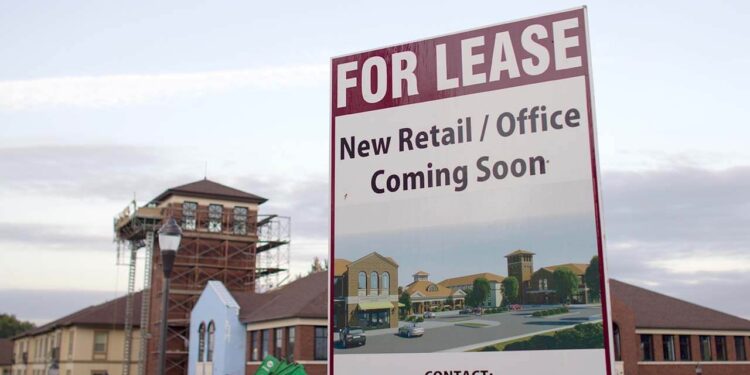Hashish firms that after struggled to seek out area to conduct cultivation, manufacturing and retail operations are benefiting from a tumultuous industrial actual property market that’s prompting landlords to rethink leasing to marijuana-related companies.
Excessive rates of interest, loans coming due and a glut of business area within the aftermath of the COVID-19 pandemic has made discovering tenants for industrial properties difficult.
An estimated $1.6 trillion in property financing is predicted to mature over the subsequent two years, in response to Washington, D.C.-based CoStar Group, a industrial actual property info and analytics agency.
On the finish of the primary quarter of 2024, $35 billion in loans have been overdue or in nonaccrual standing, the very best determine in 11 years, in response to the Federal Deposit Insurance coverage Corp.
“Individuals are beginning to scramble to seek out tenants to make their funds,” mentioned Ryan George, CEO of 420 Properties, a Sacramento, California-based marijuana and hemp actual property market.
MSOs lease mainstream actual property
Christian Tremblay, a vice chairman within the Chicago workplace of Northmarq, an actual property finance, funding and loan-servicing firm, mentioned he’s seen an enormous shift over the previous three years as conventional retail builders shift their consideration from tenants comparable to quick-service eating places to marijuana shops operated by publicly traded hashish firms, that are keen to pay greater rents.
“If you happen to’re investing within the bigger MSOs (multistate operators), you possibly can see all of the financials on-line and get a way of AUMs (belongings below administration),” Tremblay mentioned.
One of many greatest modifications, he mentioned, is that hashish firms can lease extra conventional retail areas comparable to an outer parcel at a Walmart or an addition to a mainstream purchasing middle.
“Earlier than three or 4 years in the past, they have been on secondary roads or in industrial corridors,” Tremblay mentioned of marijuana retailers.
“Extra offers are beginning to fall according to different retailers; the inherent threat is lower than it was a number of years in the past.”
Actual property threat averted
Previously, industrial landlords nervous they might be topic to civil forfeiture legal guidelines in the event that they leased property to hashish companies.
Civil forfeiture legal guidelines enable authorities to grab property – money, automobiles, homes and different belongings – suspected of being related to prison exercise.
Nevertheless, George mentioned belongings have been seized provided that the tenant was breaking the legislation and the owner knew it was occurring.
“Lots of the primary objections to hashish operators have confirmed to be unfounded at this level,” he mentioned.
Banks even have eased restrictions on hashish tenants so long as they’re in compliance with state laws.
Meilad Rafiei, CEO of California-based Hashish Actual Property Consultants, mentioned when his agency contacts landlords on behalf of its shoppers, the conversations are simpler than they have been 4 years in the past – though many nonetheless should be educated in regards to the trade.
“There’s simply loads of people who haven’t any clue what’s occurring – of their head, it’s nonetheless ‘Reefer Insanity,’” Rafiei mentioned.
“They don’t need it tied to their identify as a result of they view it as offering a sinful product to society.
“However even when they put up a stiff wall the primary few occasions, they ask questions and get extra snug.”
Hashish actual property
In mature markets comparable to California, some landlords have been coping with hashish companies for many years.
“Some have been within the illicit market, and the landlords acquired burned and mentioned, ‘No extra hashish,’” Rafiei advised MJBizDaily.
Rafiei mentioned he’s been in a position to negotiate higher charges for his hashish shoppers by illustrating the maths to landlords.
“You inform them, ‘That is now the trade is doing, that is how your tenant did whenever you charged this quantity of lease, and that is what you possibly can cost,’” he mentioned.
“It’s a matter of arithmetic: Current them with that math and precedents which have been set about how the hashish firm will fail if rents are too excessive.”
2024 MJBiz Factbook – now accessible!
Unique trade knowledge and evaluation that can assist you make knowledgeable enterprise selections and keep away from expensive missteps. All of the info, not one of the hype.
Featured inside:
- Monetary forecasts + capital funding tendencies
- 200+ pages and 49 charts highlighting key knowledge figures and gross sales tendencies
- State-by-state information to laws, taxes & market alternatives
- Month-to-month and quarterly updates, with new knowledge & insights
- And extra!
Affect of rescheduling
Transferring marijuana from Schedule 1 – the federal authorities’s checklist of probably the most harmful medicine – to Schedule 3 would decrease hashish operators’ tax liabilities and open the door for extra lenders to enter the area, Northmarq’s Tremblay mentioned.
If traders can get extra conventional lending phrases, extra consumers will take into account hashish properties due to engaging lease buildings and better cap charges.
“Steadiness sheets will look higher and present constructive web incomes,” Tremblay mentioned.
“It’s not going to occur in a single day; you continue to want 12 to 18 months of knowledge to point out a change.”
Margaret Jackson may be reached at margaret.jackson@mjbizdaily.com.








